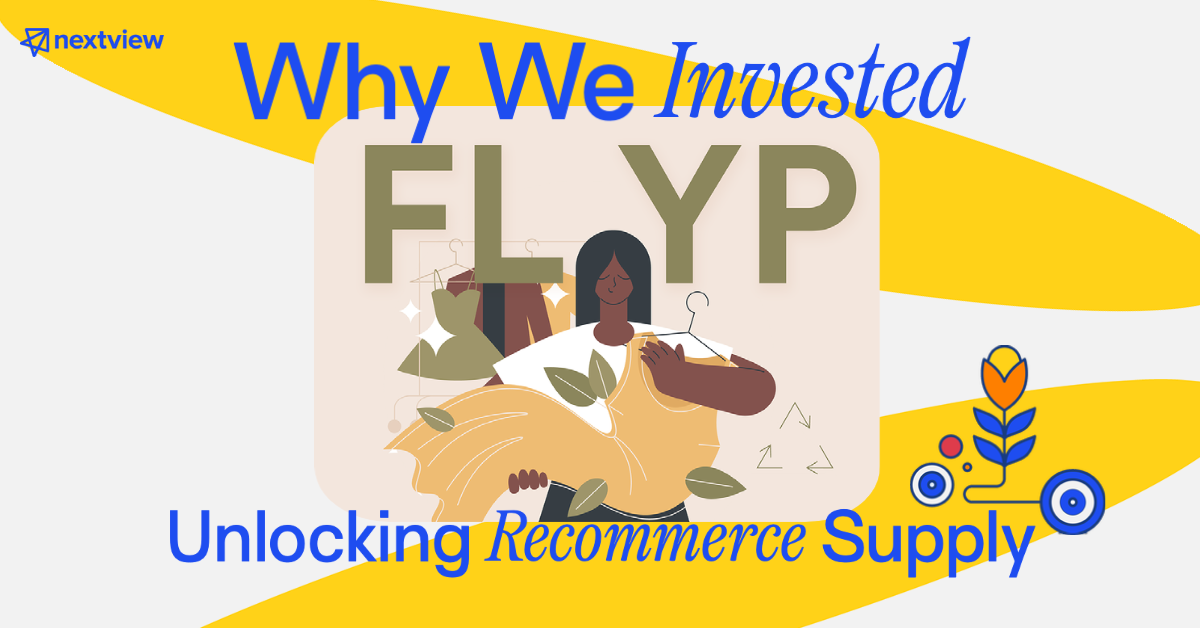
David Beisel
Since the inception of our firm a dozen years ago, my partners and I here at NextView Ventures have been believers in the power of “recommerce,” leveraging the capability of the internet to resell & reuse previously owned products. Our very first investment as a firm was into the seed round of the online consignment & thrift store thredUP. Over the subsequent decade, their offering grew to attract over a million active shoppers, culminating in last year’s $1.3B IPO. More recently, we’ve invested in Queenly (the leading marketplace for formalwear) and Nuw (a clothes swapping app). I am excited that today another one of our portfolio companies in this space, Flyp, is publicly announcing its $10M Series A financing.
Flyp’s model is quite unique, as it isn’t directly focused on the shopping consumer, but rather, on resellers who sell on the recommerce marketplaces (like thredUP or competitors such as Poshmark or The RealReal). The company has recruited a network of tens of thousands of small online resellers, frequently individual stay-at-home entrepreneurs, onto its platform. Flyp’s workflow automation capabilities and AI-driven inventory matching system empower these entrepreneurs to develop and scale their at-home reseller businesses. Through our other investments in this category, we at NextView have come to recognize the perhaps counterintuitive insight: the key to recommerce is on the supply side (not the demand side) of these marketplaces. Unlocking inventory of products that could be resold & reused so that they will be resold & reused. Professional resellers are becoming an increasingly important component of this ecosystem to further facilitate resale & reuse, with Flyp providing leverage to streamline their activities and amplify their potential earnings.
It’s important to take a step back and recognize the impetus for the consumer trend of this recommerce revolution. The first is environmental – the fashion industry alone contributes to more than 10% of global carbon emissions, so being able to save millions of items from ending up in landfills and recirculating them is fundamental. Beyond that, however, are economic and even social causes. Providing millions of shoppers with affordable items at a meaningful discount from retail yields tangible economic savings, all the while reducing shoppers’ own carbon footprint. Moreover, this circular economy is now creating and supporting hundreds of thousands of jobs for individual entrepreneurs around the country, enabling them to generate millions of dollars in income. The combination of these forces has resulted in the current cultural moment where purchasing and wearing used clothes isn’t just practical for consumers, but also trendy and cool.
I’ve had the privilege of joining Flyp’s Founders, James Kawas and Dani Arnaout, on their journey; my tenure on the company’s board started a year ago in leading their seed round of financing and will continue going forward. These two “Forbes 30 Under 30 List” entrepreneurs have spent their entire careers focused on building marketplaces within the secondhand resale economy, including product & leadership roles at Mercari, which went on to IPO. Today’s announcement welcomes other investors to the syndicate, Asymmetric Capital Partners and Tectonic, along with continued participation from us at NextView, Afore, Interlace, Alante Capital, and 1517.
The promise of the circular economy’s further expansion rests on continuing to unlock supply into the system of marketplaces that has been built over the past decades. Flyp enables enterprising reseller individuals to build their own businesses towards that aim, creating a unique and powerful role in facilitating recommerce. The company’s vision for the future is one where waste from consumer purchases is transformed into prosperous jobs for hundreds of thousands of small, stay-at-home entrepreneurs, who, in the process of reselling what would otherwise have gone to landfills, will create a massive circular economic cycle benefiting consumers, businesses, and the environment. With our mission at NextView to invest in companies which use technology to drive a brighter collective future for everyday people, I’m proud for us at NextView to be a part of that story unfolding ahead.

